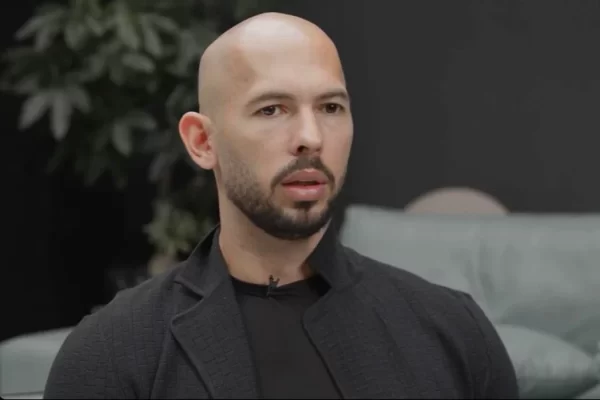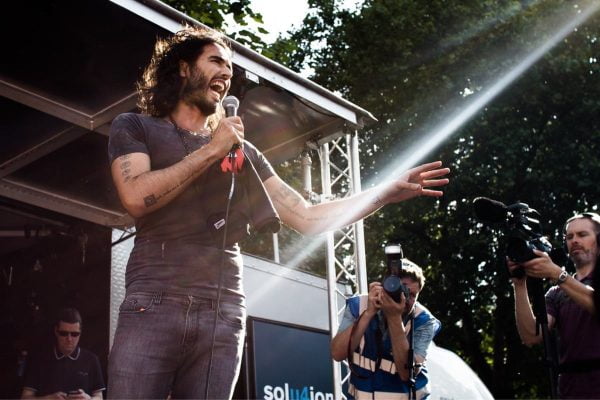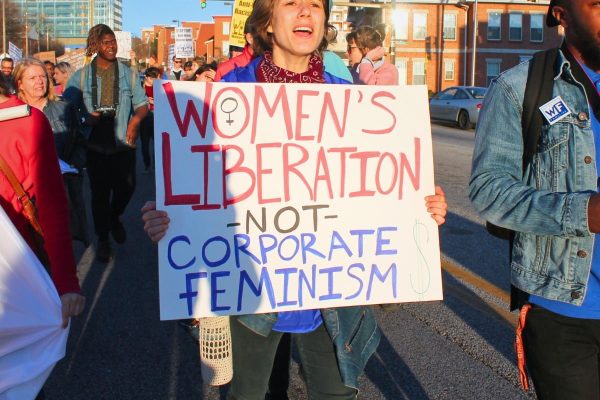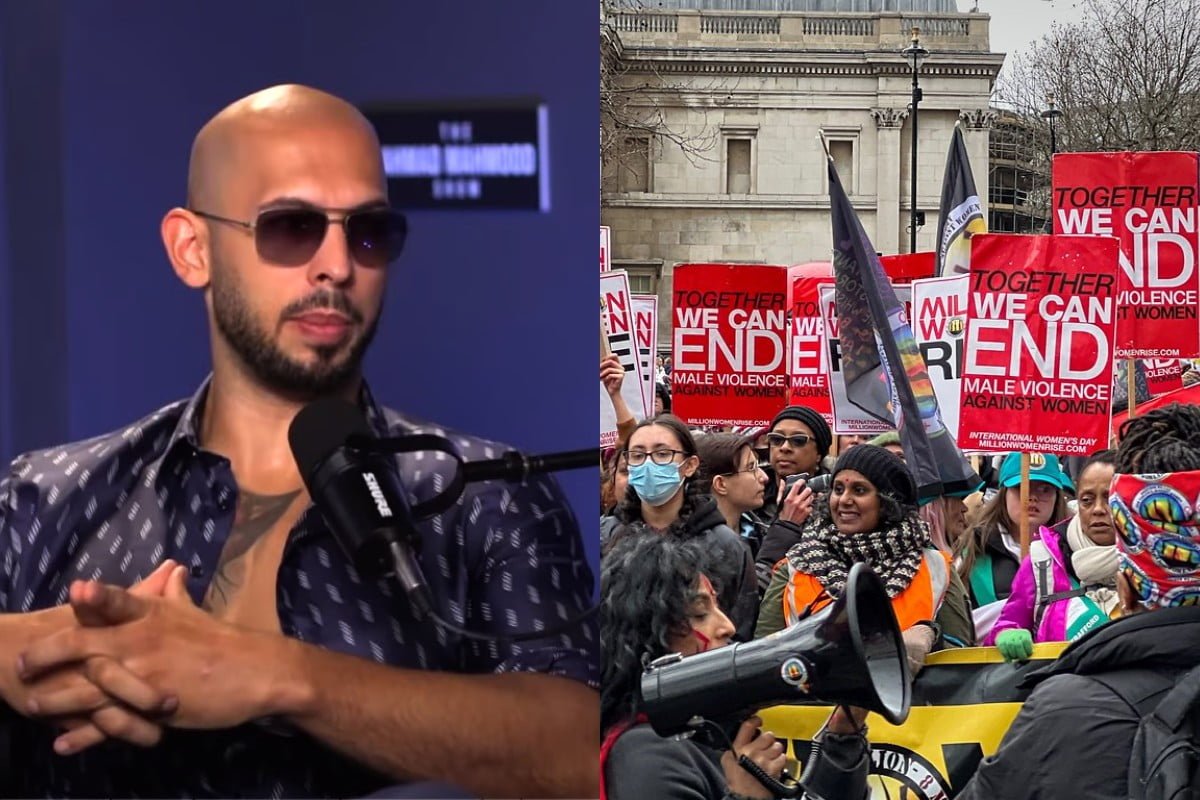On Wednesday morning this week, 27 September, a 17-year-old boy knifed and killed Elianne Andam, a teenage girl from Croydon, south London.
It is reported that the attack happened when Elianne was helping her friend, the boy’s ex, after she refused to accept his flowers.
What makes a young boy stab a 15-year-old girl in the neck to death? It makes you sick to your stomach. But this sickness runs deep in capitalist society.
Violence against women is an aggressive cancer – a cancer that seems to be spreading and growing across the world.
But it is not enough to denounce cancer. To remove this lethal tumour, we must understand where it comes from, and what conditions are nurturing it today.
Misogynistic message
The killing of Elianne Andam is only the latest horrific, tragic example.
In August 2021, Jake Davison, a 22-year-old from Plymouth, went on a shooting spree, murdering five people, including his mother and a three-year-old girl.
According to media reports, Davison had fallen into a rabbit hole of ‘inceldom’: an online community of ‘involuntary celibates’ (incels) – alienated, isolated young men who are angry that women will not sleep with them.

Their ideas – closely associated with the misogynistic ‘men’s rights movement’ and the alt-right – have become more visible in the last few years, most notably with infamous influencer and arch-sexist Andrew Tate.
At one point last year, Tate was the most googled man on earth. He rose to fame on social media through a torrent of clips in which he asserts his reactionary views and outlook: that women’s only role in society is to provide sex and rear children for men.
There’s another side to his message, however: that men should also have a clear role in society; that modern ‘woke’ attitudes towards women are holding back men from fulfilling this role; and that men (particularly young men) should resort to violence, if necessary, to ensure that their ‘rights’ are not threatened.
In one of his videos, for example, Tate claims that he’d attack a woman if she accused him of cheating. “It’s bang out the machete, boom in her face, and grip her by the neck. Shut up bitch.”
With Tate’s posts – and others like them – prevalent on TikTok, it’s not inconceivable that this video appeared, at some point, on the phone screen of the teenage boy accused of murdering Elianne.
Sexism and capitalism
Schools, workplaces, and the internet are awash with harassment and abuse against women.
Tate and his ilk clearly encourage this. But the vile ideas that he spouts don’t originate in his head. Rather, they are a crude reflection of the beliefs and attitudes that emanate from the top – from the capitalist class and their representatives in the establishment.
As Marx and Engels explained, the dominant ideas in any society are always those of the ruling class.
For decades the ruling class, big business, and the bourgeois media have promoted misogynist views: objectifying women for the sake of profit, and whipping up sexism to suit their class interests.
For years, for example, rabid rags like The Sun paraded topless models – some as young as 16 – on page three. The Daily Star only stopped this disgusting practice in 2019.
The sexualisation and objectification of women is probably even worse now. On the internet and social media it’s absolutely relentless: from violent porn, to Sidemen-style videos judging lineups of women based on their bodies.
Young boys and girls are exposed to degrading pornographic material on the internet from an early age. With the assistance of online algorithms, major porn sites are able to push their salacious content in order to drive traffic. Industry bosses don’t care what they show or who sees it, as long as it boosts their profits.
This is only a more vulgar version of what takes place across the media and the marketing industry in general. Advertisers, with the help of Big Tech and other monopolies, actively objectify and sexualise women: using female models and celebrities as tools to sell their commodities, thereby fuelling and normalising unhealthy perceptions of women in the process.
The objectification of women starts with the rich and powerful. Sleazy elite events – like those organised by ‘The Presidents Club’ deliberately hire attractive female ‘hospitality’ staff who, as well as waitressing, are expected to make themselves available to guests as play-things. Consequently, groping and harassment is widespread.
Similarly, we can look to the likes of the Bullingdon Club: the exclusive Oxford University group, notorious for hosting extravagant parties, and home to previous Tory prime ministers such as Boris Johnson and David Cameron.
“Women aren’t allowed to formal dinners,” one ex-Bullingdon member revealed, “but at informal gatherings we would make them get down on all fours like a horse, and bring out hunting horns and whips.”
All of this undoubtedly replicates itself in day-to-day society, in the form of unwanted sexual advances. Most people might agree that this is unacceptable. But the truth is that ideas promoting women as mere sexual possessions are deeply embedded within class society and capitalism.
Establishment hypocrisy
A vicious cycle emerges. Sexism from the top breeds misogyny across society, infecting culture in general. In turn, both the capitalist media and user-generated online content help to spread these poisonous attitudes and ideas.
The mainstream media and establishment might now shun the most overt, egregious examples of sexism. See, for example, how quickly the press closed ranks against Russell Brand, after allegations of harassment and assault against the celebrity were revealed in a recent documentary.
Earlier this year, meanwhile, the (male) head of the CBI bosses’ union was forced to resign after allegations emerged about a toxic ‘alpha’ culture in the organisation, including multiple accusations of rape and sexual assault.

There has undoubtedly been a shift amongst a wing of the establishment. The #MeToo movement played a role in this, acting as a battering ram. Prior to this, Hollywood boss and sexual predator Harvey Weinstein – a man who now conjures up nothing but disgust – was actively protected by powerful figures in the industry and beyond.
In fact, it was only after female victims and others collectively came forward to share their experiences that anything was done. This highlights an important lesson: mass mobilisation is our most effective weapon for bringing about social change.
The liberal alteration in tone from a section of the capitalist media is nothing but hypocrisy, however. In the decades prior to their seemingly Damascene conversion, these same establishment papers and institutions actively fostered a culture of misogyny in society.
Those tabloids now denouncing Brand, for example, previously honoured him with the title ‘Shagger of the Year’. The car that the comedian used to pick up 16-year-old girls was BBC sanctioned.
Similarly, the same publishing companies, media groups, and advertising firms now jumping on the ‘feminist’ bandwagon were formerly pumping out sexist smut. Supermarket shelves were filled with ‘lad mags’ like FHM, full of obnoxious and denigrating content, consciously targeted at impressionable teenage boys and young men.
Now they’ve cynically cleaned up their act a bit – in their public presentation, at least. But a noxious gas, once sprayed into the air, can’t be put back into the bottle.
The ideas that these big business mouthpieces helped to foment over years have now simply been exported onto the internet, pushed into the darkest corners of social media, where they are regurgitated even more crudely by individuals such as Andrew Tate.
Rotten ruling class
Liberal commentators suggest that misogyny should be a hate crime. But outlawing hatred and violence against women means nothing unless you deal with the root of the problem.
Tate and his fellow online agitators, in the worst way possible, are appealing to – and connecting with – the genuine alienation and despair that young men feel under capitalism today.
But this anger is channelled in an extremely reactionary direction, offering young men an easy – but false – solution to their problems: demand sex from women, and strive to make as much money as possible.
And when it becomes apparent that such ambitions are unattainable, men are responding with violence.
Andrew Tate and Russell Brand claim to be victims of the establishment. But the truth is, they couldn’t better embody the rotten status quo and the reprobate ruling class.
Tate tells young men that they should make money and have sex, and that this is what makes you powerful. And the antics of the establishment – from the Royal Family, to the police, to prominent media personalities – seem to confirm this.
Prince Andrew cavorts with known billionaire paedophiles. The BBC has been home to numerous sex offenders, most notably former TV presenter and darling-of-the-establishment Jimmy Savile.
The Met police, meanwhile, a key pillar of the capitalist state, are known to be institutionally sexist and racist; filled to the brim with rapists and abusers such as Wayne Couzens and David Carrick.
On the other side of the pond, attacks on women and women’s freedoms have been sanctioned at the highest levels, with the US Supreme Court giving a green light to misogynists everywhere with their assault on abortion rights.
Tate himself has been charged with rape, human trafficking, and forming an organised crime group to sexually exploit women. But is this so different from the crimes of the degenerate establishment?
Class society
Women have been oppressed since the dawn of civilization – not because of ‘human nature’, but because of inequality between the sexes arising out of class society and private property, which have subsequently been widened and deepened over millennia.
Cultural attitudes like misogyny are whipped up and fostered by the ruling class in order to justify this inequality, and to encourage divisions.
Sexism – along with racism, homophobia, and other such reactionary ideas – are useful tools for the ruling class. They distort the way we relate to one another, and divide us, the exploited and oppressed, amongst ourselves, along non-class lines.
In this way, we are told that the real division in society is not between exploiters and exploited, oppressors and oppressed, but between men and women, black and white, and so on.
These ideas have replicated themselves for hundreds of years, in different forms, not because they are correct, but because the ruling class constantly stirs-up and reinforces prejudices and bigotry in order to justify the oppression inherent within class society.
For centuries, for example, literature, art, and religion have typically depicted women as mothers or sexual objects.
But the ruling class is also fairly flexible. The capitalists can contort themselves in all sorts of ways when it comes to ideology, adapting to certain social changes and attitudes, as long as their class interests and exploitative practices are not fundamentally challenged.
In the last 100 years, there has been a drive to get more women into the workplace. And this is reflected in modern tropes about ‘strong women’ who are able to juggle family and career; who can be both a mother and a boss.
This, alongside the pressure of struggles from below against gender-based inequality, has led to a whole wing of the establishment embracing ‘feminism’ – particularly ‘girlboss feminism’ – in recent years.
These liberal ladies and gentlemen are horrified by misogynistic violence. But they cannot offer any solutions about how to end it. At the end of the day, it is the capitalist system that they defend which is responsible for perpetuating oppression in all its forms.
Liberal feminism
In fact, capitalism is making life worse for ordinary women on a daily basis.
Working-class women are disproportionately impacted by austerity – with healthcare, shelters, childcare, etc. all cut to pieces. This strips working-class women of their access to abortion services; makes them more financially dependent and vulnerable to domestic violence; and places even more pressure on them in terms of the burden of household labour.
The entire outlook of these liberal bourgeois feminists is wrong from the start. They promote the idea of the ‘patriarchy’: the myth that men in general, rather than the overarching socio-economic system, are the source of women’s problems; and, in turn, that the interests of ordinary men and women are in opposition to each other.
The recent Barbie film – much praised by liberal commentators – provides a perfect example of this. First we see ‘girlboss’ Barbies running the world. Then Ken discovers the ‘patriarchy’, and leads a misogynistic insurrection. Finally, to regain power and restore the status quo, the Barbies consciously plot to get the men to fight amongst themselves.
This may all seem like silly fun to most audiences. But it encapsulates the approach pushed by female establishment politicians, who run campaigns on empty slogans around sexism, without having anything genuinely progressive to offer working-class women or men.
The vacuous nature of the establishment’s ‘feminism’ very quickly becomes transparent to working-class men and women. It is plain to see that this is just a smiling liberal mask, behind which stands the same old ugly face of capitalism.
Furthermore, by cynically adopting identity politics and ‘wokeness’, this wing of the ruling class only helps to increase the polarisation in society, exacerbate the ‘culture war’, distract from the real class divides, and create a breeding ground for reaction.
By offering nothing but tokenistic gestures and superficial changes, the liberals push alienated young men into the arms of people like Andrew Tate – right-wing demagogues who tap into a genuine anti-establishment mood, and who appeal to ‘incels’ by telling them they are ‘victims’ of ‘woke culture’.
Revolutionary struggle
Violence against women is increasing because capitalism is in decay. It is the symptom of a sick system.
The liberal response to Tate and his followers was to try and remove his platform. But this does nothing to eliminate the conditions upon which he and his ideas thrive.
Tate – and the popularity that surrounds him – is the putrid outburst of a depraved, decrepit system. And the situation is only getting worse, with low wages, sky-high rents, job insecurity, and climate chaos ravaging workers and youth.
All over the world, society is afflicted with a deep sense of malaise. Alienation – in the form of depression, anxiety, and isolation – is intensifying by the day amongst young people. And without a socialist alternative to offer a way forward, many more will be drawn towards figures like Tate in search of a quick fix.
At the same time, alongside the rise of these reactionary tendencies, we see revolutionary developments exploding onto the streets.
Mass movements are erupting all over the planet. And many of these are in opposition to sexism and women’s oppression.
In 2018, for example, mass protests spread across Spain after a court handed out a lenient sentence in an unambiguous case of brutal gang rape, carried out by a group of men calling themselves the ‘wolfpack’. Amongst the perpetrators were a police officer and a member of the military.
Earlier that same year, meanwhile, on international women’s day, over six million people – women and men – took to the streets in Spain, in what one newspaper described as “almost a revolution”. A similar mass mobilisation took place in Switzerland the following year.
On top of this, we have seen huge struggles over abortion rights in Ireland, Poland, and across Latin America. And in Britain, the murder of Sarah Everard by a serving police officer brought thousands onto the streets.

What has been absent, however, is a revolutionary communist leadership that can channel these movements towards a fundamental transformation of society.
Consequently, the anger accumulating underneath the surface only expresses itself in a partial, distorted manner. At one end of the spectrum there are strikes, protests, and mass movements of workers and youth. At the other end, however, the crisis of capitalism creates fertile soil for misogyny, racism, and homophobia, born of alienation and desperation.
Liberal pleading and moralising will do nothing to cleanse society of this poison. Instead, we need united class struggle in pursuit of clear socialist demands, in order to ensure decent jobs, housing, and healthcare for all.
It is on this basis – through women and men coming together in the fight for their common class interests – that backward attitudes will be challenged, and consciousness will be transformed on a mass scale.
In the 1984-85 miners’ strike, for example, the direct involvement of the miners’ wives in the struggle helped to generate a big shift in consciousness amongst the male workers, rapidly changing how they viewed their partners.
A revolution would achieve the same effect on a societal level, magnified a hundred fold.
Only by overthrowing capitalism, and transforming society along revolutionary socialist lines, can we end the scourge of violence against women once and for all. We appeal to radical workers and youth to join us in this task.






